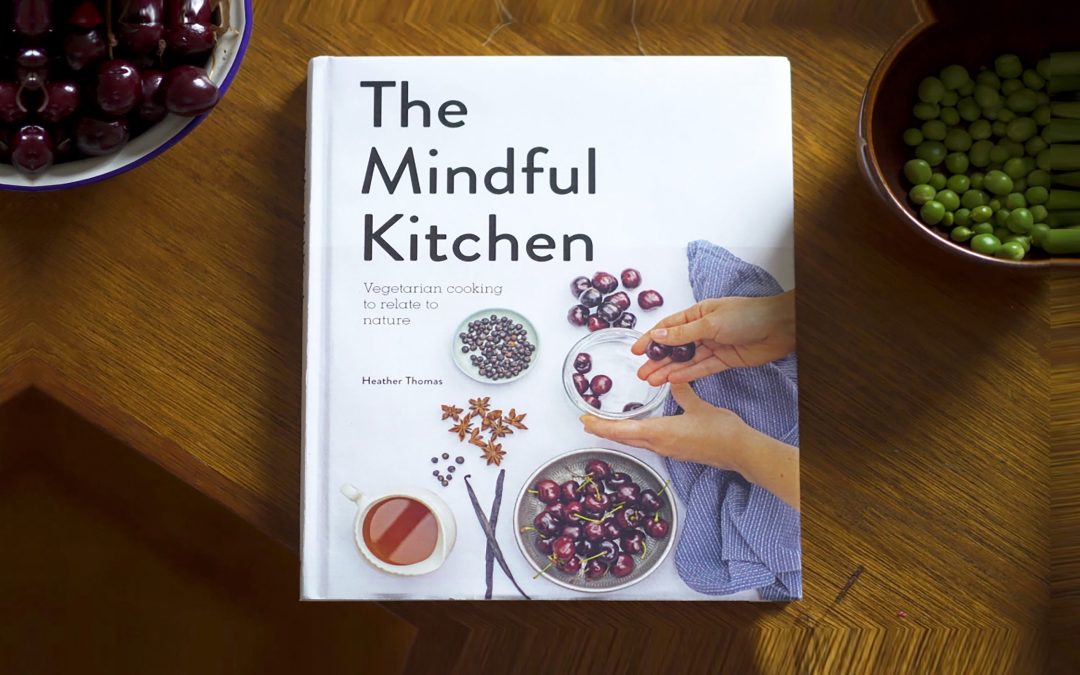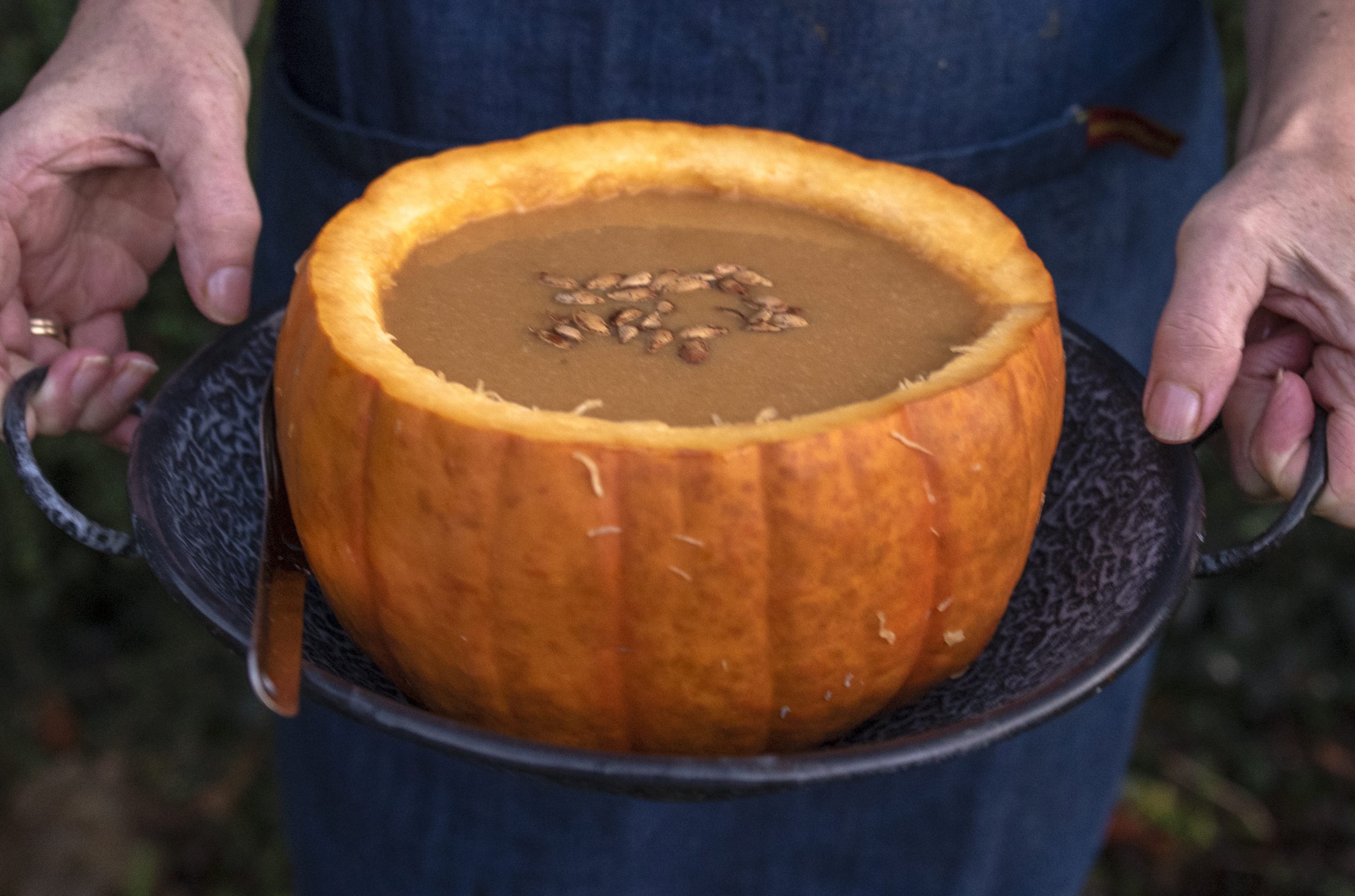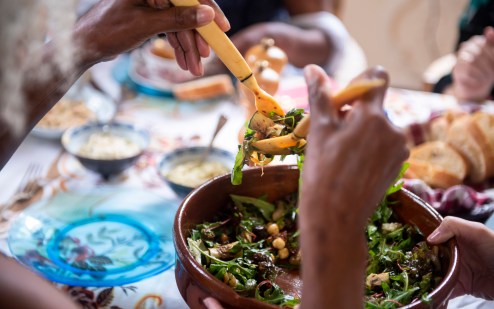The Mindful Kitchen: a new-wave cookbook from eco foodie Heather Thomas
Comfort food just got a whole lot healthier. In her new book, The Mindful Kitchen, Heather Thomas shows you how to squash anxiety by building a nature relatedness practice in the kitchen. Discover the brilliant side effects of mindful cooking, plus try a recipe here

Sponsored article.
The Mindful Kitchen from eco foodie Heather Thomas (Leaping Hare Press) infuses the everyday with simple nature-related rituals to reinforce thoughts as positive actions-creating focus, awareness and translating intent into lifestyle.
Bite-size philosophical notes, meaningful questions, joyful rituals, and an abundant feast of vegetarian recipes are mindfully stirred together in this new-wave cookbook. Offering over 100 seasonal recipes, this beautifully illustrated culinary go-to encourages you to make mindful choices through how and what you eat. Add empowering flavours for wellbeing – inspiration, curiosity, and awareness – and this is destined to be a must have in every kitchen library.
With fresh takes on old favourites, and new dishes to tickle the taste buds, there’s a recipe for every season. Here’s a quick and easy recipe from The Mindful Kitchen to use up Halloween pumpkin:
Spiced Pumpkin and Coconut Soup

Method
1. Cut a circle in the top of your Halloween pumpkin and scoop out the seeds and fibres. Remove as much flesh as possible but leave enough so that the skin can serve as a stable tureen. Peel and chop your Hokkaido pumpkin. In total you need 1 kg (2 lb 4 oz) of prepared flesh.
2. Warm the oil in a large stockpot and cook the onion, garlic and chilli until soft, about 3 minutes. Add the pumpkin flesh, bay leaves, spices, wine and stock. Bring to the boil and simmer for 30 minutes. Add the coconut milk and simmer for a further 10 minutes. Remove the bay leaves and using a hand mixer, blitz to a creamy consistency.
Serves 6
Ingredients
1 large Halloween pumpkin
1 small Hokkaido pumpkin
1 tablespoon rapeseed oil
1 onion, chopped
1 head of garlic, cloves
separated and chopped
½ chilli pepper, chopped
2 bay leaves
1 tablespoon ground cumin
½ tablespoon ground cinnamon
1 tablespoon ground ginger
200 ml/7 fl oz white wine
450 ml/16 fl oz vegetable stock
400 ml/14 fl oz coconut milk
Seven Ways Mindful Cooking Can Improve Your Wellbeing
Every morsel of food that you eat has been created by a collaboration of people, plants, animals, wind, water, soil, and countless microbiota. Food is the connector of life. The Mindful Kitchen shows you how to shape new questions about everyday foods to build knowledge about your environment and then offers cooking rituals that help you transform thoughts into meaningful action. Mindful cooking is a recipe for building wellbeing for people and planet.
Side effects of mindful cooking include:
Feeling Childlike Wonder
Have you ever watched a child revelling in delight at the sight of a blade of grass or a cardboard box and wish you could feel what they feel? Mindful cooking shows you how to shape beginners mind questions that help you discover wonder in a radish, a carrot or whatever is on your chopping board!
Feeling a Sense of Community Belonging
When you learn how to tell the story of food from the perspective of all the life and life forces that surround you, your sense of community expands. Mindful cooking can increase your feeling of community belonging, even if you are making a meal for one.
Experiencing Creative Flow
The psychologist Mihaly Csikszentmihalyi demonstrated how creativity is the central source of meaning in life. Simply put, creativity makes you feel alive and well. Mindful cooking to nourish people and planet means building awareness to promote collective vitality – and as you process new knowledge you lean into creative flow. For example, I choose soil nourishing green peas to make my guacamole for summer picnics instead of water wasting, soil depleting avocados.
Revelling in Sensuality
Mindful cooking requires you to slow down and use all your senses as you cook to boost your connection to place. All your senses are scouts for your brain. Your sense of smell, for instance, is a strong trigger of the feeling of nostalgia. Using your senses as you cook can build memories that trigger feel good emotions when you get a whiff of something in the air days, weeks and years later.
Boosting Humility
Mindful cooking teaches us to honour the value of all the life that enables us to thrive; visible or microscopic. The more we embrace our equitable place in the food web, the more we build our ability to turn off our needy ego and nourish our brains in a bath of humility – an emotional relative of awe.
Living a Meaningful Life
364 days of the year, you could reach for a slice of cake in the afternoon because you have a sweet tooth. On your birthday, that piece of cake takes on new meaning. It is a connection to loved ones past and present and when you blow out the candle on top, it embodies your dreams for the future. Mindful cooking brings a touch of beautiful birthday cake meaning to every bite.
Identifying as Nature
Our bodies are in a constant dance of exchange with the entire natural world. Whenever we breath, eat, drink, create and burn energy, we have opportunities to increase our awareness of this exchange and understand tangibly that we too are a part of nature, wherever we are. Mindfully peppering your cooking moments with this awareness is how you develop a nature relatedness practice for personal and planetary wellbeing from head to hands to habit.
The Mindful Kitchen: Vegetarian Cooking to Relate to Nature by Heather Thomas, published by Leaping Hare Press, RRP £20. To order a copy, visit: https://amzn.to/2FtZXIv









